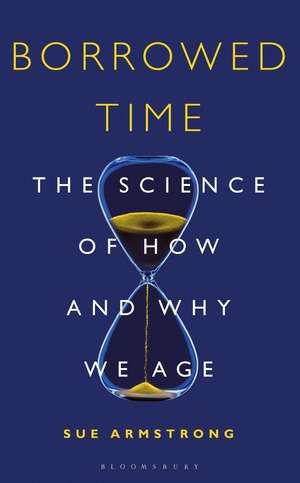Borrowed Time: The Science of How and Why We Age
Autor Sue Armstrongen Limba Engleză Paperback – 24 iun 2020
| Toate formatele și edițiile | Preț | Express |
|---|---|---|
| Paperback (1) | 69.94 lei 43-57 zile | +44.00 lei 6-12 zile |
| Bloomsbury Publishing – 24 iun 2020 | 69.94 lei 43-57 zile | +44.00 lei 6-12 zile |
| Hardback (1) | 124.16 lei 22-36 zile | +14.94 lei 6-12 zile |
| Bloomsbury Publishing – 23 ian 2019 | 124.16 lei 22-36 zile | +14.94 lei 6-12 zile |
Preț: 69.94 lei
Preț vechi: 105.95 lei
-34% Nou
Puncte Express: 105
Preț estimativ în valută:
13.38€ • 14.01$ • 11.14£
13.38€ • 14.01$ • 11.14£
Carte tipărită la comandă
Livrare economică 31 martie-14 aprilie
Livrare express 22-28 februarie pentru 53.99 lei
Preluare comenzi: 021 569.72.76
Specificații
ISBN-13: 9781472936080
ISBN-10: 1472936086
Pagini: 272
Dimensiuni: 129 x 198 x 20 mm
Greutate: 0.19 kg
Editura: Bloomsbury Publishing
Colecția Bloomsbury Sigma
Locul publicării:London, United Kingdom
ISBN-10: 1472936086
Pagini: 272
Dimensiuni: 129 x 198 x 20 mm
Greutate: 0.19 kg
Editura: Bloomsbury Publishing
Colecția Bloomsbury Sigma
Locul publicării:London, United Kingdom
Caracteristici
Discusses the psychological, philosophical and ethical implications of recent advances in research into ageing.
Notă biografică
Sue Armstrong is a science writer and broadcaster based in Edinburgh. She has worked for a variety of media organisations, including New Scientist, and since the 1980s has undertaken regular assignments for the World Health Organization (WHO) and UNAIDS, writing about women's health issues and the AIDS pandemic, among many other topics, and reporting from the frontline in countries as diverse as Haiti, Papua New Guinea, Uganda, Thailand, Namibia and Serbia. Sue has been involved, as presenter, writer and researcher, in several major documentaries for BBC Radio 4; programmes have focused on the biology of ageing, and of drug addiction, alcoholism, obesity, AIDS, CJD, cancer and stress. Her book p53: The Gene that Cracked the Cancer Code, also published with Bloomsbury Sigma, was highly commended by the BMA Book Award.
Cuprins
PrologueChapter 1: A question of definitionChapter 2: Wear and tear?Chapter 3: Telomeres: the ticking clock in our cellsChapter 4: Down but not out: senescent cellsChapter 5: Old before their timeChapter 6: Ming the mollusc and other modelsChapter 7: It's in the genesChapter 8: Eat less; live longer Chapter 9: Epigenetics and stem cellsChapter 10: The ageing immune systemChapter 11: The sting in the tail of HIV/AIDSChapter 12: The Big D - familial Alzheimer's diseaseChapter 13: Broken brains Chapter 14: Turning back the clock
Recenzii
Engrossing questions throng science writer Sue Armstrong's round-up of research on the biology of ageing. A rich, timely study for the era of 'global ageing'.
A fine introduction to the research and controversies about how we age.
Armstrong, a British science and health writer, presents, in crack Michael Lewis style, the high points of aging research along with capsule biographies of the main players.
Complex, nuanced and cautious, yet it suggests we are on the brink of a revolution.
Ms Armstrong doesn't pretend that there is any one answer to the question of why we age as we do. The science she presents is a grab bag of divergent theories, each championed by a scientific subspeciality.
As a seventy-five-year-old man I felt oddly rejuvenated by this book. Try it yourself!
Sue Armstrong's book humanely tackles ageing in a way that is grounded, philosophical and makes the most complex science accessible to lay people like me. While not dangling false hopes of innovatory medical cures, it is full of hope about the strides being made in gerontology and pharmacology. And while I may be getting older, the vigour of this book is life-enhancing.
Authoritative, comprehensible and fun to read. The book ageing research has been waiting for.
Borrowed Time gives a wonderful overview of the fast-evolving science of longevity. I thoroughly recommend this book as a primer on what will become a key industry in the next two decades or so.
A fine introduction to the research and controversies about how we age.
Armstrong, a British science and health writer, presents, in crack Michael Lewis style, the high points of aging research along with capsule biographies of the main players.
Complex, nuanced and cautious, yet it suggests we are on the brink of a revolution.
Ms Armstrong doesn't pretend that there is any one answer to the question of why we age as we do. The science she presents is a grab bag of divergent theories, each championed by a scientific subspeciality.
As a seventy-five-year-old man I felt oddly rejuvenated by this book. Try it yourself!
Sue Armstrong's book humanely tackles ageing in a way that is grounded, philosophical and makes the most complex science accessible to lay people like me. While not dangling false hopes of innovatory medical cures, it is full of hope about the strides being made in gerontology and pharmacology. And while I may be getting older, the vigour of this book is life-enhancing.
Authoritative, comprehensible and fun to read. The book ageing research has been waiting for.
Borrowed Time gives a wonderful overview of the fast-evolving science of longevity. I thoroughly recommend this book as a primer on what will become a key industry in the next two decades or so.
